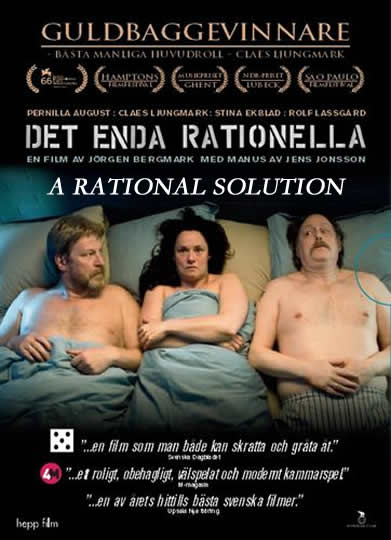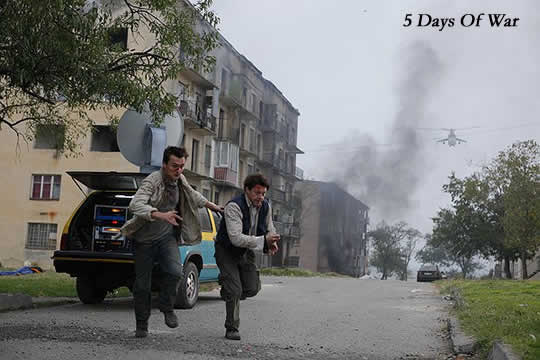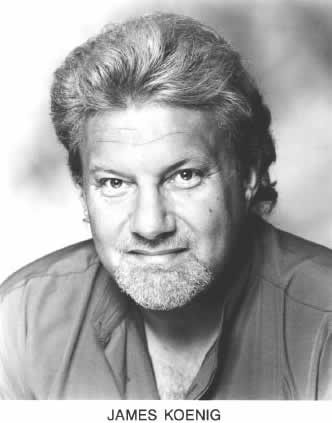Scandinavian Film Festival, Los Angeles opens on January 7, 2012. In order to learn more about 2012 festival, we had a conversation with SFFLA Founder/Director James Koenig.*
Bijan Tehrani: There are festivals in LA, dealing with filmmaking in one particular country, but Scandinavian Film Festival L.A. (SFFLA) covers all Scandinavian countries, how challenging this has been?
James Koenig: Well, let’s put it this way— It’s a good natured exercise in diplomacy. I can say the names of all five Scandinavian countries very quickly in alphabetical order forwards and backwards! We are always very careful to represent each country fairly. And of course there are the “givens” that Sweden is very large, Denmark and Norway have large film industries, and Iceland is very small, and Finland is essentially from another linguistic grouping.
It’s very interesting. I one time had occasion to introduce a new Finnish Consul General whose background was not in diplomatic work, but in film. He was Jorn Donner– an Oscar winning producer from the classic Bergman film “Fanny and Alexander.” As a writer, commentator on Swedish television, and film producer he was not exactly known for his diplomacy. When I said “It’s my pleasure to introduce one of our new Scandinavian diplomatic corps– Consul General of Finland Jorn Donner” he said (without removing the cigarette from his mouth) “Well, Finland isn’t exactly Scandinavia.” I think I said something like “Well, we’re glad you’re here anyway and hope you enjoy your time in Los Angeles.”
The truth is, there are three definitions of Scandinavia and two of the three omit somebody else. It’s sort of a tale of three peninsulas– the Scandinavian Peninsula, the Ostrobothnian peninsula, the Karelian Peninsula. Scandinavia geographically is the Scandinavian Peninsula. That encompasses Denmark, Norway, and Sweden– which would leave out Finland, and far away Iceland even though Icelanders are descendants from the original Vikings!
Then we have the linguistic grouping. Swedish, Danish, Norwegian, and Icelandic are all Germanic languages. Icelandic is related to old Norse. But that would, except for its linguistic Swedish minority, leave Finland out!
As in the global economy of today, definitions are often created by trade. Many countries on the Baltic Sea were part of the Hanseatic League and linked by seafaring trade in and out of Baltic ports. For a long time before Finnish Independence, Finland with its unique language and culture went back and forth between being ruled by Sweden and Russia. On the “nearest to Sweden” side of Finland was the Ostrobothnian peninsula (which now comprises almost two-thirds of Finland). On the other side is the Karelian peninsula which goes nearly to St. Petersburg. On December 6, 1917 Finland became an independent and sovereign nation state rather than a Russian Grand duchy in 1917– just 95 years ago! Certainly Finland’s culture has an eastern influence. Finnish culture has deep roots in Karelian culture. When Finland became independent, they were forced to cede the Karelian Peninsula to Russia. With hardly any notice people in Finnish Karelia were given a choice to “be out by the end of the week” or become Soviet citizens. Finland absorbed her displaced people as the trail of tears had people leaving with practically nothing more than the clothes on their backs. Culturally, politically, and economically Finland has stronger ties to the west. Her strong alliances were to the west. And so today’s definition of Scandinavia encompasses three peninsulas and includes the geographic, cultural, and economic grouping that includes Denmark, Finland, Iceland, Norway, and Sweden.
The filmography of each country is quite different. Denmark, linked geographically to central Europe, has the oldest film industry– with I believe the oldest continually producing film studio in the world, Nordisk Film. And now there is, of course, Lars von Trier’s Zentropa. Sweden has a large film industry which became known to the rest of the world through the films of Ingmar Berman. Norway’s film industry is now absolutely competitive with Sweden and Denmark. And Finland’s film industry has grown by leaps and bounds and is producing wonderful films. It is no longer only Aki Kaurismaki and the Kaurismaki brothers who are the known names of Finnish film makers. When SFFLA began 13 years ago, we screened a Kaurismaki film at a somewhat late screening and it was like a “cult” meeting. Two thirds of the arriving audience was in black leather.
 While each of the Nordic countries (we often use Nordic as a synonym for Scandinavian) has it’s own individual film industry, Nordic film in general is an industry without borders. All one needs to do is watch the credits roll at the end of a film. On-screen and off-screen talent represent the certain “inter-Nordical-ism”– (to make up my own word for it.) Swedes work in Denmark and Danes work in Sweden and Norway etc. etc. And then there is amazing Iceland. The entire nation is around 350,000 in population– and yet excellent films are being produced in Iceland. Iceland has its Old Norse ties linguistically and culturally to Norway, and close economic ties to Denmark. (Denmark has the Faroe Islands, which also produces some films– but that’s another story. At a film festival in Norway I saw the first feature length film in Faroese.)
While each of the Nordic countries (we often use Nordic as a synonym for Scandinavian) has it’s own individual film industry, Nordic film in general is an industry without borders. All one needs to do is watch the credits roll at the end of a film. On-screen and off-screen talent represent the certain “inter-Nordical-ism”– (to make up my own word for it.) Swedes work in Denmark and Danes work in Sweden and Norway etc. etc. And then there is amazing Iceland. The entire nation is around 350,000 in population– and yet excellent films are being produced in Iceland. Iceland has its Old Norse ties linguistically and culturally to Norway, and close economic ties to Denmark. (Denmark has the Faroe Islands, which also produces some films– but that’s another story. At a film festival in Norway I saw the first feature length film in Faroese.)
I am an “honorary Finn” and am proud to have been decorated as Knight of the Order of the Finnish Lion via my life as a classical musician and teacher. But in my “film life” and involvement with “things” Scandinavian, I think it helps that I am “none of the above.” And no Swede can name-call me a Norwegian. And no Norwegian can name-call me a Swede etc. etc. (even in jest). And in the midst of all– I am unbiased and fair to all. It’s a conscious effort. I know that’s a long answer to your question– but it sets the stage for what we present and what we deal with.
BT: What should we expect to see in the 2012 festival? And are films selected for Best Foreign Language Film OSCAR, by Scandinavian countries part of the festival?
JK: We have wonderful films on the program for the lucky 13th festival! First of all, we are lucky to have all five of the Nordic Oscar submissions! (Sometimes that’s not possible for all titles.)
We have some very interesting pairings. The first week we’ll have Pernille August in a directorial role in her directorial debut film BEYOND (which is the Swedish Oscar submission). The following week-end we’ll see her on-screen as a lead in A RATIONAL SOLUTION. And this year, I can say “We are often accused of being the festival that offers Prozac instead of popcorn. But this year is risible proof that there are good laughs in Nordic films as well as the dark stuff we know and love.” I love some of our shorts and documentaries as well. A Swedish documentary called “WOMEN WITH COWS” is very moving (no pun intended). And a delightful Norwegian short– BALD GUY– is guaranteed to put a song in your heart. Various films deal with issues of gender and human rights– in places like Iran, India, and Kurdistan. And, yes, I know those places aren’t in Scandinavia! But with a camera, there are no borders.
BT: At Cinema Without Borders, we are proud to contribute to one of the events of the festival, we would like that our readers to learn about it from you.
JK: There are a lot of people from the Nordic countries working in Hollywood. Our festival has proven to be great networking grounds for people in the film industry. We’ve had two Norwegian films by Pink Panther and Karate Kid II director Harald Svart. Two stars of any number of Finnish films– Irina Bjorklund and Peter Franzen (Priest of Evil) live part of the year in Hollywood for work here. This year we will be pleased to have noted Finnish Director Renny Harlin presenting his 2011 American film FIVE DAYS OF WAR. Harlin is an amazing Hollywood success story with an incredible catalogue of films to his credit– he has scared the bejeezus out of us, and made us laugh. He will be presenting his American film– FIVE DAYS OF WAR in a special SFFLA screening in collaboration with Cinema WIthout Borders. FIVE DAYS OF WAR unfolds in the setting of the 2008 war between Georgia and Russia in the region of South Ossetia. In the film, Cuban-American Hollywood actor Andy Garcia portrays President of Georgia Mikheil Saakashvili. Harlin will introduce the film and do Q &A afterwards. Renny Harlin will be the recipient of the Cinema Without Borders’ Bridging The Borders Award.
Pink Panther and Karate Kid II director Harald Svart. Two stars of any number of Finnish films– Irina Bjorklund and Peter Franzen (Priest of Evil) live part of the year in Hollywood for work here. This year we will be pleased to have noted Finnish Director Renny Harlin presenting his 2011 American film FIVE DAYS OF WAR. Harlin is an amazing Hollywood success story with an incredible catalogue of films to his credit– he has scared the bejeezus out of us, and made us laugh. He will be presenting his American film– FIVE DAYS OF WAR in a special SFFLA screening in collaboration with Cinema WIthout Borders. FIVE DAYS OF WAR unfolds in the setting of the 2008 war between Georgia and Russia in the region of South Ossetia. In the film, Cuban-American Hollywood actor Andy Garcia portrays President of Georgia Mikheil Saakashvili. Harlin will introduce the film and do Q &A afterwards. Renny Harlin will be the recipient of the Cinema Without Borders’ Bridging The Borders Award.
BT: Are there filmmakers guests attending the festival?
JK: We will, of course, have other film makers at the festival with their films– on-screen and off-screen talent. Pernilla August (director of Beyond, lead actor of A Rational Solution) will be at the festival along with leading actor from Beyond, Noomi Rapace of Girl With the Dragon Tattoo and Millenium Triology fame. And many other directors, producers and actors will be there with various films. Peter Franzen and Irina Bjorklund, who turn in chilling performances in PRIEST OF EVIL, will be there. Asking “who” makes me feel like an Oscar winner on-stage trying to remember names of everybody. There short answer is “There will be lots of Nordic film makers and stars at the festival.” I’m also very happy that our closing film– THE SOUND OF NOISE– began as a 2 1/2 minute short screened at SFFLA a few years ago. And the Norwegian film HEADHUNTERS is a great film that has broken box office records. I could go on and on– and probably already have! Come see for yourself!
BT: Please tell us about the dates that festival is held and how film fans can attend the festival?
JK: Check out information on all of the films at our web-site www.sffla.net. You can “read about” and “watch trailers”! You can also order tickets online, or call the box-office at 323 661 4273. A great point of information. The American Scandinavian Foundation of Los Angeles is the parent organization of SFFLA. As a non-profit cultural and educational event we extend free admission to full-time students with a valid student I.D. to all screenings unless the film is sold out. Check out the various packages– from individual tickets to a festival passport for everything– the best deal in town!
BT: Please tell us about festival sponsors.
JK: Of course the festival wouldn’t happen without our sponsors–the American Scandinavian Foundation of Los Angeles (ASFLA), the Barbro Osher Pro Suecia Foundation, ELMA (European Languages and Movies in America); SWEA (Swedish Women’s Educational Association), Taste is Everything Catering, individual donors like Dan and Susan Gottlieb of the G2 Gallery, and our wonderful staff of volunteers! And here’s something very cool– SWEA will present its annual film grant at SFFLA ! The grant is a $10,000 award for an “up and coming” Swedish filmmaker. And then there’s our official water– VOSS, and something to make your mouth water–Nice Cream, and Siggi’s, and Kerrygold, and lots of tasty offerings from our Nordic Cafe open for networking and noshing.
 *James Koenig has a life that is full of both sub-titles and super-titles. When not immersed in Nordic film, he is a classical singer and teacher who has appeared in opera, concerts, and recitals around the United States and in Europe in Scandinavia, Italy, and Germany in venues as diverse as Carnegie Hall, the Dorothy Chandler Pavilion, the Teatro Olympico in Vincenza, Italy; Teatro La Fenice in Venice, Theatro Duse in Asolo, Italy, and New York’s Central Park. He has had recitals broadcast on National Public Radio. His voice has been heard in many arts arenas as a performer, teacher, director, writer, and presenter. His interest in film began in high school when he had to find his way across town to see “subtitled” “art films!” His film interest continued during his time at Northwestern University where he earned and bachelors and master’s degrees. “I majored in music and minored in Chicago.” says Koenig. “When I started spending time in Europe, I became even more interested in foreign language films. And in my profession, I was constantly dealing with language and translations. The flavor of the original is irreplaceable by something ‘in translation.'” He has served on juries for both singing competitions and film juries. Long considered an “honorary Finn” he was decorated as a Knight of the Order of the Finnish Lion by the Finnish government for his work for Finnish music and culture. He has been a presenter for the Los Angeles Philharmonic Upbeat Live– pre-concert lecture series. He has written journalistic pieces for Odyssey Classical Music Publications in the U.K. and various publications in the United States. He has written theatrical and liturgical pieces as well as a novel. He founded the 13 year old Scandinavian Film Festival L.A. after being invited to attend a screening of a Nordic film that didn’t have distribution in North America, and realizing that there are many wonderful films that people have all too few opportunities to see.”
*James Koenig has a life that is full of both sub-titles and super-titles. When not immersed in Nordic film, he is a classical singer and teacher who has appeared in opera, concerts, and recitals around the United States and in Europe in Scandinavia, Italy, and Germany in venues as diverse as Carnegie Hall, the Dorothy Chandler Pavilion, the Teatro Olympico in Vincenza, Italy; Teatro La Fenice in Venice, Theatro Duse in Asolo, Italy, and New York’s Central Park. He has had recitals broadcast on National Public Radio. His voice has been heard in many arts arenas as a performer, teacher, director, writer, and presenter. His interest in film began in high school when he had to find his way across town to see “subtitled” “art films!” His film interest continued during his time at Northwestern University where he earned and bachelors and master’s degrees. “I majored in music and minored in Chicago.” says Koenig. “When I started spending time in Europe, I became even more interested in foreign language films. And in my profession, I was constantly dealing with language and translations. The flavor of the original is irreplaceable by something ‘in translation.'” He has served on juries for both singing competitions and film juries. Long considered an “honorary Finn” he was decorated as a Knight of the Order of the Finnish Lion by the Finnish government for his work for Finnish music and culture. He has been a presenter for the Los Angeles Philharmonic Upbeat Live– pre-concert lecture series. He has written journalistic pieces for Odyssey Classical Music Publications in the U.K. and various publications in the United States. He has written theatrical and liturgical pieces as well as a novel. He founded the 13 year old Scandinavian Film Festival L.A. after being invited to attend a screening of a Nordic film that didn’t have distribution in North America, and realizing that there are many wonderful films that people have all too few opportunities to see.”

